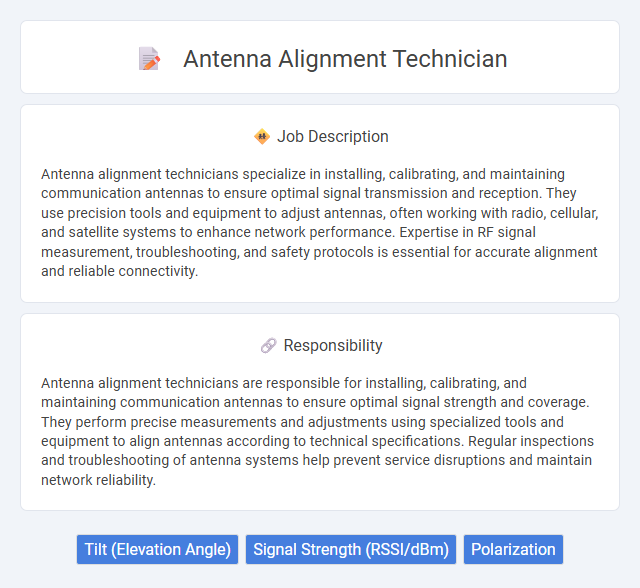
Antenna alignment technicians specialize in installing, calibrating, and maintaining communication antennas to ensure optimal signal transmission and reception. They use precision tools and equipment to adjust antennas, often working with radio, cellular, and satellite systems to enhance network performance. Expertise in RF signal measurement, troubleshooting, and safety protocols is essential for accurate alignment and reliable connectivity.
Individuals with strong spatial awareness and good hand-eye coordination are likely to be well-suited for the role of an antenna alignment technician. Those who are comfortable working at heights and in varying weather conditions may find the job manageable and rewarding. People who prefer routine desk work or have difficulty with physical tasks might struggle with the demands of this position.
Qualification
Antenna alignment technicians must have strong technical knowledge of RF engineering and experience with precision measurement tools. Certifications such as FCC license or specialized training in antenna types and signal propagation enhance job qualification. Proficiency in using alignment software and interpreting signal metrics is essential for accurate installation and maintenance.
Responsibility
Antenna alignment technicians are responsible for installing, calibrating, and maintaining communication antennas to ensure optimal signal strength and coverage. They perform precise measurements and adjustments using specialized tools and equipment to align antennas according to technical specifications. Regular inspections and troubleshooting of antenna systems help prevent service disruptions and maintain network reliability.
Benefit
Antenna alignment technicians likely enjoy benefits such as competitive salaries and opportunities for career advancement in telecommunications. The role may offer hands-on experience with cutting-edge technology and specialized training that enhances professional skills. Benefits could also include travel opportunities and the potential for stable, long-term employment in a growing industry.
Challenge
Antenna alignment technicians often encounter challenges related to precise calibration under variable environmental conditions, which can significantly impact signal quality and system performance. The probability of facing technical difficulties increases in remote or harsh locations requiring adaptive problem-solving skills and meticulous attention to detail. Success in this role likely depends on the technician's ability to troubleshoot complex alignment issues efficiently while maintaining safety protocols.
Career Advancement
An antenna alignment technician advances by mastering precision calibration techniques, enhancing signal optimization skills, and gaining expertise in advanced telecommunications equipment. Career growth opportunities include progressing to senior technician roles, specializing in network engineering, or transitioning into project management within the telecommunications industry. Continuous certification in RF technologies and hands-on experience with emerging 5G infrastructure significantly boost advancement potential.
Key Terms
Tilt (Elevation Angle)
An antenna alignment technician specializes in precisely adjusting the tilt or elevation angle of antennas to optimize signal strength and coverage for wireless communication networks. Accurate tilt calibration is crucial for minimizing interference and maximizing transmission efficiency in cellular and broadcast systems. Skilled technicians employ specialized tools and software to ensure the antenna's elevation angle aligns with network design specifications, enhancing overall connectivity performance.
Signal Strength (RSSI/dBm)
Antenna alignment technicians play a crucial role in optimizing signal strength by precisely adjusting antennas to achieve peak Received Signal Strength Indicator (RSSI) measured in dBm. Accurate alignment directly impacts network performance, reducing interference and maximizing data throughput for wireless communication systems. Mastery of signal measurement tools and understanding RSSI variations enable technicians to enhance connectivity and maintain robust network reliability.
Polarization
Antenna alignment technicians specialize in adjusting the physical orientation of antennas to optimize signal polarization, ensuring maximum signal strength and quality. Proper polarization alignment minimizes cross-polarization interference and enhances communication efficiency in wireless networks. Mastery of polarization concepts, including linear and circular polarization, is critical for maintaining optimal antenna performance.
 kuljobs.com
kuljobs.com